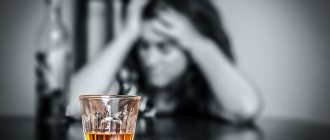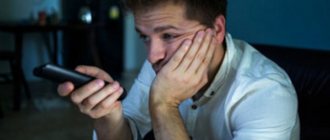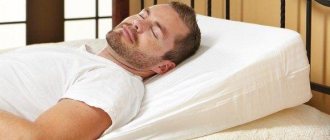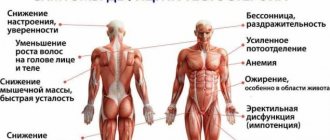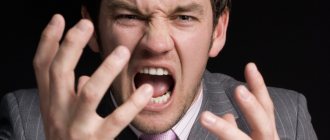To feel good, it is important for any person to get enough sleep. It seems that drinking alcohol makes you sleepy, but why then is it difficult for some people to fall asleep with a hangover? And sleep doesn’t come, and even if it does, it’s not at all satisfying with its quality. Let's figure out why this happens and what to do.
Causes of insomnia after alcohol
The main cause of alcoholic insomnia is hypersympathicotonia. This is a condition in which the sympathetic part of the nervous system, under the influence of ethanol, is in increased tone. The systems responsible for sleep are also overstimulated, causing a person to become tense and anxious.
The reasons leading to insomnia in alcoholism include health problems accumulated as a result of long-term addiction to alcoholic beverages:
- Increased or decreased heart rate;
- Changes in blood pressure;
- Pain in the stomach and esophagus;
- Heaviness in the side (in the place where the liver is located);
- Headache;
- Chronic fatigue and depression;
- Emotional instability.
The listed symptoms do not contribute to a restful sleep and often lead to insomnia after alcohol. This applies to people suffering from long-term addiction to alcoholic beverages.
According to WHO (World Health Organization) recommendations, the safe dose for men is 40 g of pure alcohol per day. Women can drink no more than 30 g of alcohol per day. At the same time, a person should not take a drop of alcohol into his mouth for 2 days a week!
Sleep process
Insomnia from alcohol may manifest itself for the first time already at this stage. Deep sleep sometimes lasts until midnight, and then gives way to insomnia. Although in most cases a person sleeps deeply until the morning, by dawn fragmentary meaningless dreams appear that accompany disturbing thoughts. Alcoholic depression begins to take effect at this stage.
Interesting fact. People who suffer from alcoholic insomnia and have not drunk alcohol for several days, after a week they behave as if they were 1% intoxicated. They experience lethargy, increased emotionality, nervous exhaustion, anxiety, and poor memory.
Types and signs of insomnia
Insomnia with a hangover is a natural reaction of the body to a critical situation (alcohol poisoning). From an evolutionary point of view, this is explained by the manifestation of activity: in a life-threatening situation, a person must run away or hide, which is in no way compatible with sleep.
Doctors divide insomnia into several types:
- Difficulty falling asleep. A person lies in bed for a long time, but cannot fall asleep. Asomnia is aggravated by panic, headache, nervous tension and aching joints;
- Increased sleep sensitivity. The person falls asleep, but the sleep does not last long. An alcoholic wakes up from the slightest irritant. Insomnia is accompanied by nightmares and visions;
- Complete insomnia. This type of insomnia occurs with long-term alcoholism. The person is resistant to sleep or falls into a light sleep but is awakened by hallucinations;
- Poor sleep hygiene. Insomnia is complemented by improper sleep schedules, overeating and smoking;
- Inorganic insomnia. Its cause is mental illness that appears against the background of alcoholism.
One type of insomnia develops against the background of withdrawal syndrome (withdrawal syndrome). Popularly this is called “breaking”. Withdrawal syndrome manifests itself 6-48 hours after the last drink.
Withdrawal from alcohol is manifested by increased agitation, trembling hands, convulsive seizures, and hallucinations. The person suffers from nausea, headache and asomnia.
Drugs that are not recommended for a hangover
To combat insomnia, tranquilizers, sleeping pills and sedatives (calming) drugs are prescribed. Some of them taken immediately after alcohol are dangerous for health and even life. In this case, sensitivity to pain decreases, breathing becomes difficult, and glucose levels sharply decrease or increase.
Doctors do not recommend taking drugs from the following list for hangovers:
- Phenazepam. It is a tranquilizer that calms the nervous system, prevents seizures, relieves muscle tension and helps you sleep. One of the contraindications to its use is acute alcohol poisoning. If you take Phenazepam the next morning after intoxication, severe side effects will appear. The person will become depressed, and his consciousness will become clouded and confused. The condition is complemented by fear, suicidal tendencies and lack of control over words and actions. This leads to the fact that a person becomes equally dangerous to others and himself;
- Afobazol. The drug belongs to the group of tranquilizers and is often prescribed for withdrawal symptoms (popularly referred to as alcohol withdrawal). However, with a hangover, Afobazole is simply useless, since its effect begins only 5-7 days after the start of treatment;
- Phenibut. This drug belongs to tranquilizers and nootropics (medicines that have a positive effect on brain function). Doctors recommend taking this remedy not during a hangover, but during withdrawal symptoms;
- Valoserdin. This is a sedative that relieves muscle spasms. The daily dose of the drug contains more than 3 g of ethyl alcohol, and therefore the drug is contraindicated for anyone who suffers from alcoholism;
- Valocordin. The drug belongs to the group of sedatives and is often prescribed to patients with phobias and increased anxiety. For alcoholism, this drug is prescribed with increased caution.
Neglect of the choice of medications can lead to serious complications, aversion to alcoholic beverages or death.
Cycles
There are 5 stages of sleep, 1 pair each: fast and slow. Normally, immersion in dreams looks like this:
- Slow descent into a half-asleep state is the stage of falling asleep.
- Shallow or light.
- The third stage is the appearance of rapid dreams.
- The fourth phase or the phase of deep dreams.
- The final stage is a gradual exit from the deep stage to wakefulness.
The complex should take at least 7 hours, therefore, if a person gets up early, then accordingly he should go to bed earlier. When taking alcohol-containing drinks, the phases are disrupted, replaced and occur either too slowly or too quickly.
What does somnia look like when drinking alcohol, regardless of the volume drunk:
Falling asleep
The drowsiness stage is one of the important phases of normal somnia.
Drinking alcohol leads to temporary oxygen starvation. The patient feels fatigue and increased relaxation, but the energy supply of ethyl has not depleted.
A person who drinks alcohol skips the sleep phase and immediately falls into the deep sleep phase.
Dream
After immersion in the deep phase, a person is overcome by dreams, images, or external stimuli.
At this stage, he does not feel the touches or voices of others. The condition is similar to unconsciousness, but the process lasts no more than 4 hours.
Interruption of rest, twitching of limbs and auditory receptors are activated from midnight. Subsequently, insomnia occurs with corresponding symptoms of intoxication.
Awakening
Awakening can be fast or slow depending on the volume drunk and individual perception of ethyl. A hangover syndrome develops, or there are no signs of abuse, but during the day unpleasant sensations arise: drowsiness, lethargy, apathy.
You can suspect alcoholic insomnia based on the following signs:
- anxiety;
- painful nightmares;
- waking dreams or hallucinations;
- fear without reason;
- fatigue;
- lack of energy;
- daytime sleepiness;
- constant dozing.
It is noteworthy that the clinical picture of the pathology depends on the degree of intoxication, and the more drinks consumed, the more pronounced the syndrome. Over time, biorhythms get lost and the usual daily routine breaks down.
Valerian
This is a sedative based on valerian officinalis. It includes essential oils, polysaccharides, organic acids, glycosides and other substances that have a beneficial effect on the nervous system. Prescribed for mild disorders of the heart and blood vessels, agitation and insomnia due to overexcitation.
The drug is available in the form of a solution and film-coated tablets. You can also purchase valerian in the form of dry herbs and boil it. The product has virtually no contraindications. The only limitation to its use is individual intolerance to the active or auxiliary substances.
The cost of Valerian is from 53 rubles.
Motherwort
Motherwort is another drug based on a medicinal plant. Available in the form of tablets, tinctures and dried herbs, from which you can prepare a decoction yourself.
The product has a mild calming effect and helps cope with insomnia. In addition, motherwort is actively used for the treatment and prevention of epilepsy, cardiovascular diseases and gastrointestinal disorders.
Contraindications for use: individual intolerance, erosive gastritis, stomach and duodenal ulcers.
The cost of Motherwort is from 35 rubles.
Therapy
Treatment of alcoholic insomnia comes down to taking medications. It is recommended to undergo a pathology diagnosis before starting therapy to ensure the effectiveness of treatment.
If the cause of insomnia lies in addiction, further diagnosis and treatment is carried out by a narcologist.
The main fact during treatment is the complete abstinence from drinks containing alcohol and other decay or fermentation products.
Permitted medications
When giving up alcohol, as well as to make you feel better, the following medications are used to normalize rest:
- sedatives – designed to calm the central nervous system and start metabolism;
- sedatives - necessary to normalize the daily routine and relieve overstimulation;
- absorbents to eliminate toxic decomposition products;
- tranquilizers or psychotropic drugs - intended for the treatment of drunkards.
Medicines are administered orally and parenterally, depending on the stage of the pathological process and signs of the disease. If parenteral administration of medications is necessary, the patient remains in a hospital setting.
Prohibited
Some drugs have a retroactive effect and cause drug addiction. The composition of such products includes elements that are not compatible with ethyl residues in the body. The following types of medications are strictly prohibited:
- hawthorn tincture;
- diphenhydramine;
- Elenium;
- alzolam;
- donormil.
To ensure that the patient does not acquire another addiction in attempts to normalize somnia, the prescription of medications should be entrusted to professionals.
Sleeping pills are not suitable for the treatment of alcoholic insomnia, as the effect may not occur or may cause a number of side effects.
Novopassit
Novopassit is a sedative drug based on components of plant origin: valerian, lemon balm, St. John's wort, hawthorn, passionflower incarnate, hops, elderberry.
The product is commercially available in the form of tablets and solution. It is prescribed for mild forms of insomnia caused by nervous tension and overexcitation.
The drug is contraindicated for:
- Individual intolerance;
- Myasthenia gravis (muscle weakness);
- Up to 12 years of age.
In acute forms of gastrointestinal and liver disorders, brain diseases, epilepsy and alcoholism, Novopassit is prescribed with caution.
The cost of Novopassit is from 196 rubles.
Mexidol
The drug is prescribed to correct disorders that arise from drug addiction and addiction to alcoholic beverages. It is also prescribed for mild mental disorders, increased anxiety, neurotic disorders and withdrawal syndrome, which often causes insomnia. Available in the form of an injection solution and film-coated tablets.
Mexidol is contraindicated for:
- Increased sensitivity;
- Liver and kidney failure;
- Carrying and feeding a child;
- In childhood (up to 18 years).
The cost of Mexidol is from 280 rubles.
Glycine
Glycine is a metabolic drug that is a metabolic regulator. Once in the body, it normalizes the activity of the central nervous system, which helps to avoid emotional and psychomotor agitation.
The drug has a number of beneficial effects on the body:
- Has an antioxidant effect;
- Removes toxic substances;
- Increases human adaptation in society;
- Eliminates aggression and emotional stress;
- Reduces the toxic effect of alcohol;
- Makes it easier to fall asleep.
The cost of Glycine is from 40 rubles.
Before starting treatment, consult a specialist. Do not combine sleeping pills and sedatives - such actions often lead to severe side effects, some of which are fatal.
Emergency medical care
In some cities, you can call drug treatment specialists who can help you quickly break out of binge drinking and get rid of alcohol-induced insomnia. For this purpose, detoxification measures are carried out. The patient is given droppers containing drugs to cleanse the blood. These are mainly solutions of folic acid, sodium chloride and glucose.
IV
Specialists at private clinics administer to patients, in addition to these medications, vitamins and safe sleeping pills.
The help of a narcologist has a positive effect on a person. Him:
- the condition stabilizes;
- the feeling of “withdrawal” goes away;
- the functioning of the nervous system is normalized;
- pulse and blood pressure stabilize;
- nausea is eliminated.
Folk remedies
Homemade remedies do not always give the expected results, but have virtually no side effects. Decoctions of motherwort, lemon balm, mint and St. John's wort will help you get rid of anxiety and calm down.
Insomnia after binge drinking can go away if you follow these recommendations:
- Before going to bed, drink 500 ml. milk. To enhance the effect, add 2 tbsp to the milk. d. honey. Add honey to a warm drink. Under the influence of high temperatures, the beneficial properties of the product are lost;
- Take a bath with aromatic oils or thyme infusion. This will improve the general condition of the body, calm you down and help you sleep;
- Mix 200 ml. kefir with tbsp. honey Drink the resulting mixture at night;
- Drink slightly alkaline mineral water. This drink has a beneficial effect on the stomach and normalizes metabolism;
- If you do not have cardiovascular diseases, visit a bathhouse or sauna. Thanks to increased sweating, toxic substances and decay products are removed from the body along with excess fluid, and sleep improves;
- Prepare the Bull Punch cocktail. Take 500 ml. beef broth, 1 tbsp. vodka, 100 ml. Worcestershire sauce and 50 ml. lemon juice. Mix. Drink three times a day.
Do not forget about an in-person consultation with a medical specialist. If homemade decoctions are used inappropriately, even they can lead to an allergic reaction. We are talking about anaphylactic shock or angioedema, which require immediate medical attention.
Non-medicinal measures to improve sleep
If a person has obvious difficulties falling asleep as a consequence of alcohol abuse, you can moderately physically tire yourself just before going to bed. Any reasonable type of load is suitable for this. But the best thing to do is walk in the fresh air.
If the state of the cardiovascular system allows (i.e. the person does not have high or low blood pressure), then a contrast shower or a visit to the bathhouse helps to quickly establish sleep after binge drinking. This is a really quick way to recover from withdrawal symptoms - but we don’t recommend taking too much steam in the sauna, because... These are extreme loads. Just sweating is enough.
Don’t forget to first make sure that your blood pressure is within normal limits before taking a counter shower or visiting a sauna or steam bath. Deviations in both directions are a good reason to refuse these procedures.
Less critical requirements for weakness and slight deviations in blood pressure after a binge are other water procedures that are beneficial for sleep. We are, of course, talking about taking a relaxing bath.
For greater effect, you can use aromatherapy products with a calming and sleep-promoting spectrum of action. For example, lavender, lemon balm and a number of others oils, as well as special bath salts, work very well and improve the effect of taking a bath.

